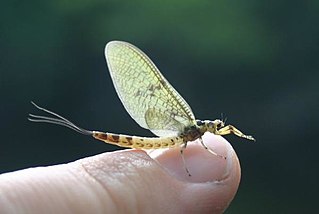
Mayflies are aquatic insects belonging to the order Ephemeroptera. This order is part of an ancient group of insects termed the Palaeoptera, which also contains dragonflies and damselflies. Over 3,000 species of mayfly are known worldwide, grouped into over 400 genera in 42 families.

Ephemera are items which were not originally designed to be retained or preserved, but have been collected or retained. The word is etymologically derived from the Greek ephēmeros ‘lasting only a day’. The word is both plural and singular.
Ephemera is transitory written and printed matter.

Ephemeridae is a family of mayflies with about 150 described species found throughout the world except Australia and Oceania.

Ephemera danica, the green drake or green drake mayfly, is a species of mayfly in the genus Ephemera.

Ephemera is a genus of mayfly in the family Ephemeridae. It contains the following species:

Baetis is a genus of mayflies of the family Baetidae, known as the blue-winged olive to anglers. There are at least 150 described species in Baetis. They are distributed worldwide, with the most variety in North America and northern Europe.

Anemonoides blanda, syn. Anemone blanda, the Balkan anemone, Grecian windflower, or winter windflower, is a species of flowering plant in the family Ranunculaceae. The species is native to southeastern Europe and the Middle East. The specific epithet blanda means "mild" or "charming". The genus name is derived from the Greek word anemos, or wind.

Cloeon dipterum is a species of mayfly with a Holarctic distribution. It is the most common mayfly in ponds in the British Isles and the only ovoviviparous mayfly in Europe. Males differ from females in having turbinate eyes.

Ephemera vulgata is a species of mayfly in the genus Ephemera. This mayfly breeds in stationary water in slow rivers and in ponds, the nymphs developing in the mud.
Cystidicoloides tenuissima is a species of nematodes in the order Spirurida and family Cystidicolidae. It is a parasite of salmonid fish in the northern hemisphere and has mayflies as the alternate host.

Ephemera guttulata, commonly known as the eastern green drake, shad fly and coffinfly, is a species of mayfly in the genus Ephemera. The eastern green drake is native to the continental United States and Canada. Its conservation status per the NatureServe conservation status ranking system is G5, meaning it is secure.
Neoephemeridae is a family of large squaregill mayflies in the order Ephemeroptera. There are at least four genera and about 17 described species in Neoephemeridae.
Caenis latipennis is a species of small squaregilled mayfly in the family Caenidae. It is found in Central America and North America. In North America its range includes all of Canada, all of Mexico, and the continental United States.
Caenis tardata is a species of small squaregilled mayfly in the family Caenidae. It is found in North America.
Ephemera annandalei is a species of burrowing mayfly in the family Ephemeridae.
Most likely, Ephemera compar is an extinct species of burrowing mayfly in the family Ephemeridae. It was found in North America. Ephemera compar is known from a single specimen, collected from the "foothills of Colorado" in 1873, but despite intensive surveys of the Colorado mayflies reported in 1984, it has not been rediscovered.

Ephemera simulans is a species of mayfly. It is commonly found throughout the United States. The species is used for fly fishing.









